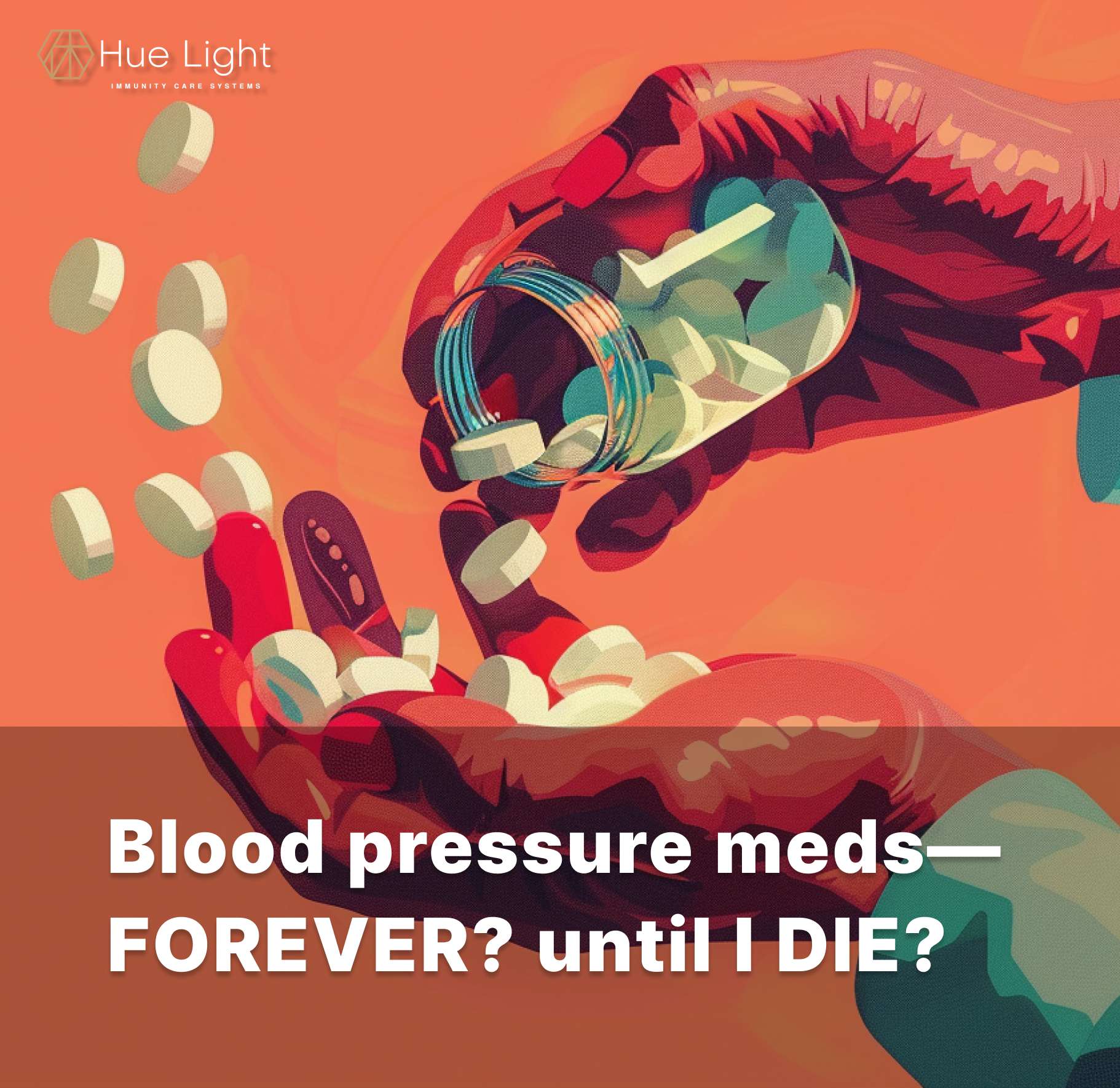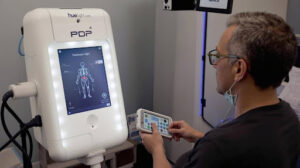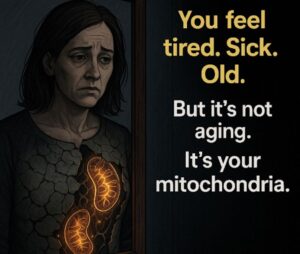High blood pressure, also known as hypertension, is a serious medical condition that increases the risk of serious health problems over time. And that is why doctors often prescribe blood pressure medications for life-long usage.
“So, is there a way to stop it?”
The answer depends on several things, like overall health conditions, the cause of high blood pressure, and how the body responds to treatment. While it’s generally taken for life, some people manage to lower their pressure level or even stop medications with lifestyle changes and alternative treatments.
In this article, we will discuss why blood pressure medications are commonly prescribed long-term and when it’s possible to stop taking them. Plus, we’ll also introduce you to a powerful, drug-free alternative that helps you manage your blood pressure more naturally and improve your overall well-being.
Why Blood Pressure Medications Are Often Prescribed Long-Term?
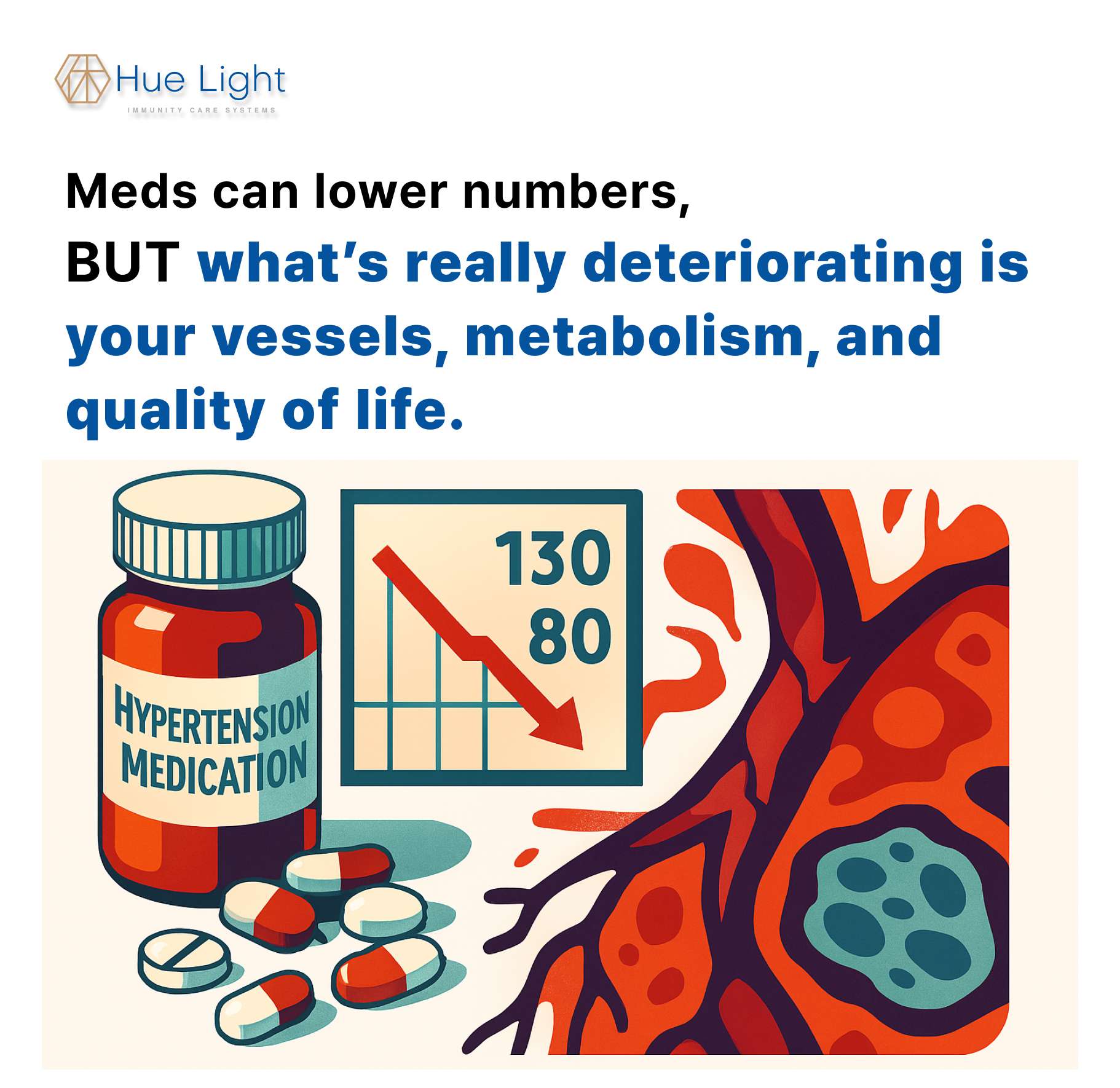
While high blood pressure itself is not a disease, it significantly increases the chances of life-threatening risks like heart attack, stroke, kidney disease, vision loss, and more. So, it’s critical to keep pressure levels in control to prevent such risks.
Medications are effective in quickly lowering pressure levels and keeping them under control. Skipping medication may cause the blood pressure to rise again, increasing the risk of complications.
High blood pressure usually has no symptoms which makes it difficult to detect without regular monitoring. This silent nature is what makes it especially dangerous, as damage can occur without any warning signs.
In other words, high blood pressure has no direct solution and we can only control or manage it over time. So, on-going medication is critical to prevent any future serious health complications.
In short, medication acts as a protective shield. But it doesn’t cure the root cause.
Can You Ever Stop Taking Blood Pressure Medication?
As discussed above, blood pressure medicines are usually taken for lifetime. But there are ways you can lower your medicine dosage and eventually stop it (although in rare cases and not guaranteed).
Most importantly, it must be strictly under a doctor’s supervision. You should never stop taking your medication on your own, and doing that can lead to dangerous spikes in blood pressure.
It depends on several key factors:
- Causes of high blood pressure
- Initial level of your blood pressure
- Body response to medication and lifestyle changes
- Your doctor’s assessment over time
If your numbers improve and stay stable, the doctor may gradually lower your dose or switch you to a different medication.
In What Conditions Can You Stop?
You may be able to stop taking blood pressure medication if:
- Your Blood Pressure Has Stabilized at a Healthy Level: If your readings consistently fall within the normal range (around 120/80 mmHg or below), and you’ve maintained this for several months, your doctor may consider gradually reducing your medication. But remember, stability over time is key.
- You’ve Made Significant Lifestyle Changes: If you’ve committed to regular exercise, lost weight, adopted a heart-healthy diet, and reduced stress, these efforts can have a powerful impact. In many cases, these lifestyle adjustments reduce the need for medication.
- You’re on a Low Dose and Haven’t Needed Adjustments: People who take low-dose medication and haven’t needed recent changes may be candidates for a slow reduction, if other factors look good.
- You Have No Other Health Conditions That Require Blood Pressure Control: If you’re otherwise healthy and your only concern was mildly elevated blood pressure, there may be less risk in gradually reducing medication with medical supervision.
In What Conditions Should You Continue
On the other hand, some people should continue taking their blood pressure medication long-term.
This includes those who:
- Have Other Chronic Health Conditions: If you have diabetes, kidney disease, or cardiovascular problems, controlling blood pressure is critical, and medication may be necessary to manage overall risk.
- Have a Strong Family History of Hypertension or Stroke: Genetics play a role. If close relatives had high blood pressure or related complications, staying on medication may help you avoid similar outcomes.
- Haven’t Responded Well to Lifestyle Changes Alone: Even with efforts like diet, exercise, and stress management, some individuals still need medication to reach or maintain healthy blood pressure.
- Experience Spikes or Fluctuations Without Medication: If your readings rise significantly when you’re off medication, or fluctuate too much, it’s safer to stay on a prescribed treatment plan.
Side Effects and Risks of Suddenly Stopping
Stopping blood pressure medication all at once may seem harmless, especially if your readings have improved. But doing so can have serious, even life-threatening consequences.
Blood pressure medications work by helping the heart and blood vessels function more efficiently. Suddenly removing them can throw your body into shock. This reaction is known as withdrawal or rebound hypertension, and it can raise blood pressure to dangerously high levels in a short time.
Common Withdrawal Symptoms:
- High blood pressure
- Chest pain
- Fast heartbeat
- Anxiety
- Swelling in legs, feet, or hands
Long-Term Risks:
- Heart failure
- Artery damage
- Stroke
- Kidney damage
- Erectile dysfunction
- Vision problems
- Cognitive decline
Always consult with your doctor before making any changes. They will create a safe reduction schedule if it’s suitable for your condition.
How To Stop Taking Blood Pressure Medication Safely
The first and most important step in stopping blood pressure medication is consulting with your doctor.
Your doctor needs to:
- Review your current health and medications.
- Check for any risks (like heart disease, stroke history, or kidney problems).
- Determine if you’re a good candidate for a trial withdrawal.
Never stop taking blood pressure medication on your own.
If your doctor agrees it’s safe to try, here’s what the process may look like:
- Gradual Dose Reduction: Your doctor may lower your dose slowly over weeks or months to observe how your body responds.
- Regular Monitoring: You’ll likely need to monitor your blood pressure at home daily and report any changes or symptoms.
- Frequent Checkups: You’ll have follow-up visits to assess progress and adjust the plan as needed.
- Continued Healthy Habits: Lifestyle changes must remain consistent. Stopping medication doesn’t mean going back to old habits.
- Be Ready to Restart: If your blood pressure starts to rise again, your doctor may recommend restarting medication to protect your health.
Alternatives to Blood Pressure Medications
While medication is often necessary, especially in moderate to severe cases, meds only control pressure levels, but do not restore endothelial function, improve metabolism, or rebalance the autonomic nervous system.
Medications:
- Don’t regenerate endothelial tissue
- Don’t address oxidative stress or inflammation
- Bypass—not repair—self-regulation systems
So, it’s critical to explore holistic strategies that target the root causes of hypertension. For this, there are certain complementary approaches that can support healthy blood pressure.
Many of these focus on treating the root causes and improving overall cardiovascular health. Here are some of the most effective options:
1. Lifestyle Modifications
Lifestyle is the foundation of long-term blood pressure control. Doctors often recommend these changes alongside, or even before, prescribing medication.
- Diet: A heart-healthy diet like the DASH (Dietary Approaches to Stop Hypertension) plan emphasizes fruits, vegetables, lean proteins, and low sodium. Reducing salt and processed foods can lower blood pressure naturally.
- Exercise: Regular physical activity (like brisk walking, swimming, or cycling) strengthens the heart and improves circulation. Aim for at least 30 minutes a day, most days of the week.
- Stress Management: Chronic stress raises blood pressure. Managing stress through mindfulness, time management, or professional support can have a measurable impact.
- Sleep: Poor sleep quality is linked to hypertension. Improving sleep hygiene and addressing conditions like sleep apnea can help regulate blood pressure.
2. Natural Supplements
Some natural supplements have shown promise in supporting blood pressure control, though they should always be used under medical supervision.
- Magnesium and potassium help regulate blood vessel tone and fluid balance.
- Omega-3 fatty acids (from fish oil) can reduce inflammation and improve heart health.
- Garlic extract has been shown in some studies to modestly lower blood pressure.
While natural, these supplements can interact with medications, so consult your healthcare provider before adding them to your routine.
3. Mind-Body Practices
The mind and body are deeply connected, especially when it comes to blood pressure.
- Meditation and deep breathing exercises can activate the parasympathetic nervous system, helping to reduce heart rate and relax blood vessels.
- Yoga and tai chi combine movement, breath control, and mental focus, all of which are linked to lower blood pressure levels.
These practices can be excellent daily habits to complement medical treatments and improve emotional well-being.
4. Photobiomodulation (PBM Therapy)
One of the most exciting and emerging drug-free therapies for supporting blood pressure health is Photobiomodulation (PBM).
Blood pressure drugs only lower your numbers, but your vessels, metabolism, and quality of life may still deteriorate.
This is because most medicines don’t:
- Regenerate endothelial function
- Reduce oxidative stress
- Restore autonomic balance
On the other hand, Photobiomodulation is not only about controlling numbers. It’s about restoring the systems behind them. PBM uses specific wavelengths of red and near-infrared light to penetrate the skin and stimulate cellular function.
Research suggests PBM can:
- Improve circulation by increasing nitric oxide production
- Relax blood vessels and reduce vascular resistance
- Decrease inflammation, a common contributor to hypertension
- Support mitochondrial energy production, enhancing overall cellular health
Unlike medication, PBM doesn’t come with systemic side effects, making it a promising complementary approach, especially when paired with lifestyle changes.
So, are you going to rely on meds forever or choose true recovery with our advanced Photobiomodulation therapy?
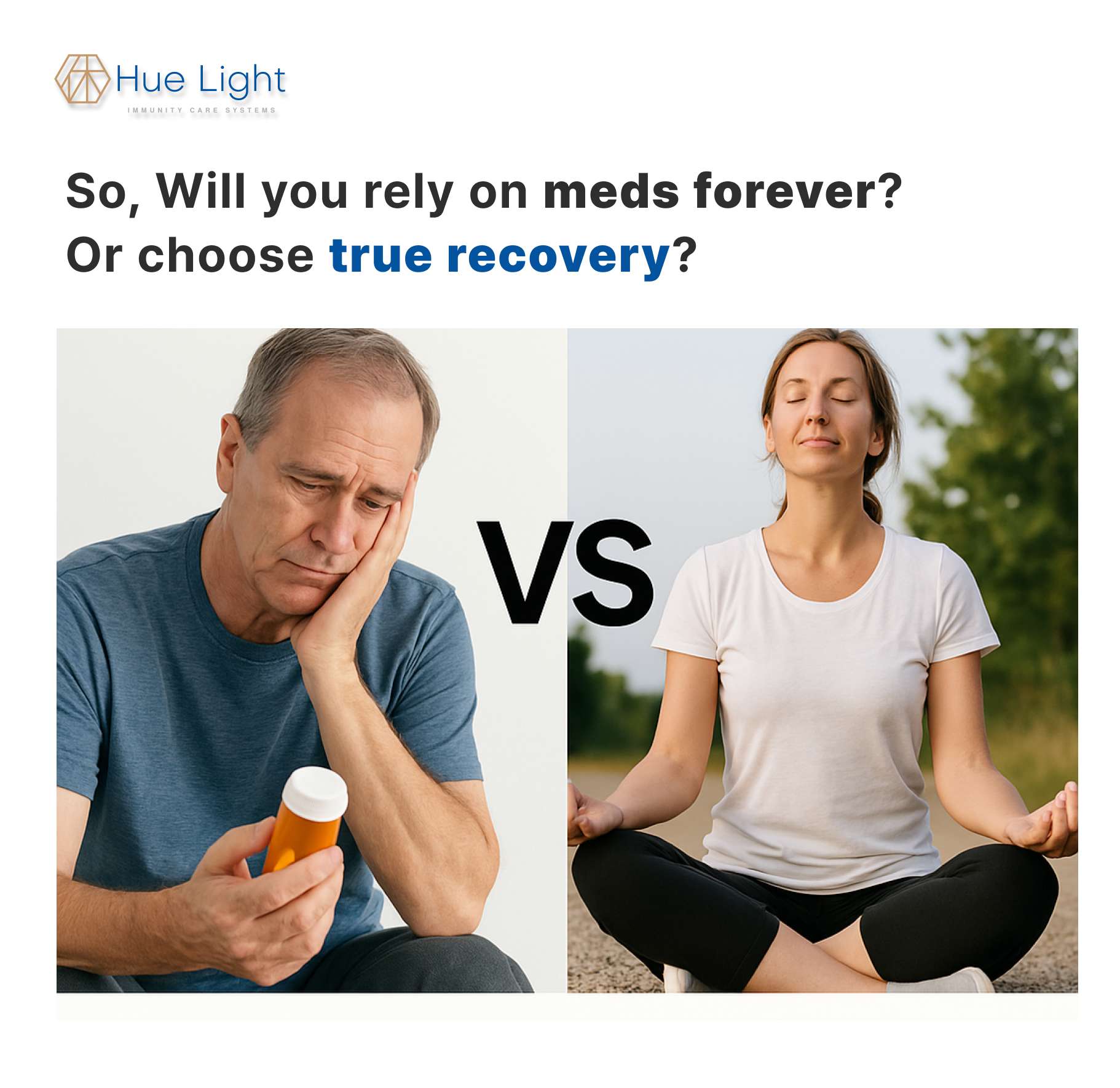
Experience PBM at Home with Huelight’s Device
At HueLight, we offer safe, easy-to-use at-home PBM devices designed to support healthy blood flow and cellular recovery.
Our technology delivers clinically-researched light wavelengths directly to the body, helping you take control of your health naturally, without pills or invasive procedures.
If you’re looking for a non-drug alternative to help manage your blood pressure, our PBM device may be the best solution you’ve been waiting for.
Fill our contact form and we’ll get back to you as soon as we can.
